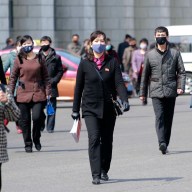TORONTO – Cancer rates are rising among teens and young adults in Canada, presenting those affected with unexpected challenges at a time when peers are preoccupied with education, first jobs and marriage.
A report from the Canadian Cancer Society says it’s not clear what is behind the rise in rates, which is more pronounced in young women than it is in young men.
Rates of new cases are rising by about 1.4 per cent a year among females aged 15 to 29 while in young men in that age group, the increase is just under one per cent a year.
The report, part of the society’s annual statistical update on cancer in Canada, says roughly 2,075 young Canadians receive a diagnosis of cancer and 326 people in this age group die from the disease each year.
“Cancer is a devastating disease for anyone, but it can be especially difficult for a young person,” Heather Logan, senior director for cancer control policy and information, said in a news release.
“These young people are in high school or university, building a career or raising a family. Cancer is not something they were expecting to deal with at this stage in their lives.”
Where a few decades ago cancer in a young person often had a poor prognosis, now the picture is brighter. The five-year survival rate for all cancers in this group is 85 per cent, up five per cent from 1992 and 1995.
The cancer death rates declined in both young women and young men in the decade from 1996 to 2005, dropping by 1.4 per cent a year in females and 2.9 per cent a year in males.
But even if survival rates have improved, going through cancer treatment at this time of life has a huge impact on patients and their extended circle of family and friends, cancer experts say. For one thing, cancer treatments can trigger health problems down the road and can threaten the ability of young cancer survivors to have children of their own.
“While the increase in survival is good news, more information is needed about cancer in this age group and about the unique challenges these young patients face so more can be done,” said Loraine Marrett, chair of the statistics steering committee and an epidemiologist with Cancer Care Ontario.
The most common cancers among young men are testicular cancer and lymphoma, while lymphoma and thyroid cancer are the most common cancers among young women. The most common cause of cancer death in this demographic is leukemia.
The cancer society suggested young people should learn how to minimize their risks of developing cancer as well as how to spot it if it does occur. That includes getting Pap tests to screen for cervical cancer, reducing unsafe exposure to sunlight and UV rays emitted by tanning beds, and maintaining healthy habits like exercising, eating a good diet and not smoking.
As for the population as a whole, the Canadian Cancer Society estimated that 171,000 new cases of cancer will be diagnosed this year, up 4,600 from last year. And it estimated that 75,300 people in the country would die from cancer in 2009, up 1,500 from 2008.
Cancer survival rates have improved among Canadians of all ages as well as among younger adults. The five year survival rate for people diagnosed with cancer between 2002 and 2004 is 62 per cent, up 4.5 per cent from a decade earlier.










